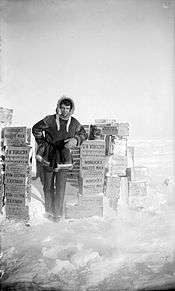Malted milk
Malted milk is a powdered gruel made from a mixture of malted barley, wheat flour, and evaporated whole milk.
Malt powder comes in two forms: diastatic and nondiastatic. Diastatic malt contains enzymes that break down starch into sugar; this is the form bakers add to bread dough to help the dough rise and create a certain crust. Nondiastatic malt has no active enzymes and is used primarily for flavor, mostly in beverages. It sometimes contains sugar, coloring agents, and other additives.[1]
History

London pharmacist James Horlick developed ideas for an improved, wheat and malt-based nutritional supplement for infants. Despairing of his opportunities in England, James joined his brother William, who had gone to Racine, Wisconsin, to work at a relative's quarry. In 1873, James and William formed J & W Horlicks to manufacture their brand of infant food in nearby Chicago.[2] Ten years later, they earned a patent[3] for a new formula enhanced with dried milk. The company originally marketed its new product as "Diastoid", but trademarked the name "malted milk" in 1887.[4][5]
Despite its origins as a health food for infants and invalids, malted milk found unexpected markets. Explorers appreciated its lightweight, nonperishable, nourishing qualities, and took malted milk on treks worldwide. William Horlick became a patron of Antarctic exploration, and Admiral Richard E. Byrd named a mountain range in Antarctica after him. Back in the US, people began drinking Horlick's new beverage for enjoyment. James Horlick returned to England to import his American-made product back home and was eventually made a baronet.[2] Malted milk became a standard offering at soda fountains, and found greater popularity when mixed with ice cream in a "malt". "Malt shops" owe their name to the Horlick brothers.[4]
Uses
- Malted milk biscuits
- Malted milkshakes
- Malted hot drinks, such as Horlicks and Ovaltine
- Malted milk balls: malted milk is used in the popular candy confections Whoppers (manufactured by Hershey Co.), Mighty Malts (manufactured by Necco), and Maltesers (manufactured by Mars, Inc).
- Malted milk is used in some bagel recipes as a substitute for non-diastatic malt powder.
See also
References
- ↑ Bates, Anna Thomas. "Malt, the forgotten flavor and nostalgic treat". Journal-Sentinel. Retrieved 10 November 2015.
- 1 2 Kitchen Lore: The History of Malted Milk Powder
- ↑ U.S. Patent 278,967
- 1 2 listing at Wisconsin history library
- ↑ Image of the Horlick brothers' factory